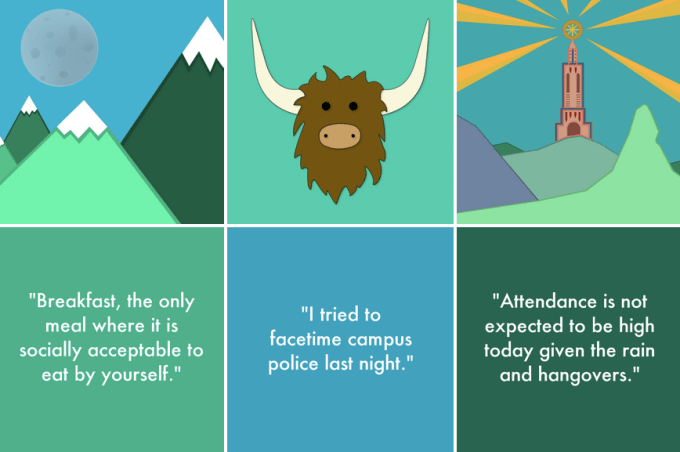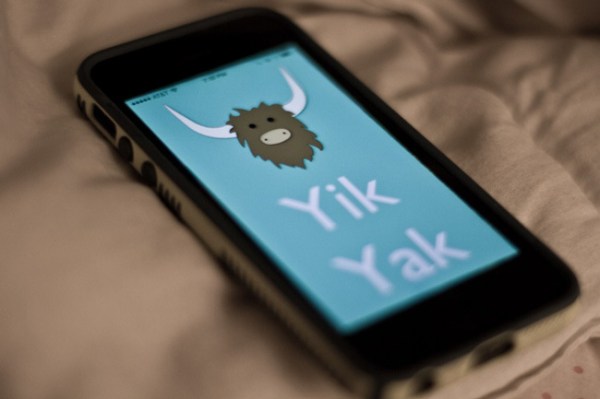Anonymous social networking apps are having a moment. Following the notable funding rounds for apps like Secret ($8.6 million) and Whisper ($21 million!), newcomer Yik Yak is today announcing a small amount of outside investment, too. In its case, the company has raised $1.5 million in seed funding for its “hyper-local” chatting app, which controversially grew popular with school kids, leading to several bannings due to cyberbullying, drawing national headlines.
Yik Yak’s investors include Vaizra Investments (who led), DCM, Azure Capital Partners, and other angels. The company says it will put the funding toward enhancing the product features, fueling growth, and expansion outside the U.S.
Founded by two Furman University students, Tyler Droll and Brooks Buffington, Yik Yak was originally intended as a message board-like service for college campuses, allowing users to post short missives which can be viewed by anyone in a 1.5 mile radius. But shortly after its launch just a few months ago, the app was picked up by a number of middle schoolers and high school kids, who took advantage of Yik Yak for anonymous bullying, as it turned out.
One could argue that perhaps Yik Yak’s creators should have better thought through the repercussions of building a simple tool for anonymous postings, especially in a post-Ask.fm world where we’ve surely since learned the dangers involved with services where cyberbullying is allowed to run rampant. (Ask.fm was implicated in over a half dozen teen suicides, for those unfamiliar.)
But at least the duo quickly reacted to the growing bullying problem on the service by implementing geo-fences around all nearly all U.S. middle and high schools using third-party location data. This blocked the app from functioning on school grounds, effectively shutting down access to these younger students who were, until then, the largest demographic on Yik Yak. They also rated the app 17-plus on the App Store, allowing parents to block downloads using the iPhone’s built-in parental controls.

Today, the app has a presence at over 100 universities across the U.S., the company says, and is growing by 100 users per network per day. Co-founders Droll and Buffington declined to share user numbers, but noted that several of the campuses where Yik Yak is used are big schools with over 10,000 Yik Yak users. (On Google Play, the app is listed as having between 100,000 and 500,000 downloads. Combined with the iOS version, one can assume that the app has several hundred thousand users at least. The app is also generally ranked in the top 20-25 in the iTunes App Store.)
The company says that average campus conversion rates will see the majority of student population using Yik Yak within a few weeks, and it sees over 90% daily engagement among active users.
Also of note: Droll says that implementing the geo-fences didn’t decrease Yik Yak user numbers. “However, geo-fencing did cause a decrease in bullying which is exactly what we intended for it to accomplish,” he says. “We feel that high school students are psychologically less mature than college students and are more likely to use anonymity irresponsibly, which is why we took the proactive method to deter high school students from ever getting hooked on Yik Yak.”
After the geo-fences were in place, Yik Yak users began spending more time on the app, and many actively police their communities through the voting and reporting mechanisms, adds Droll.
With the new investment, the team of just two will be expanded to include developers, a UI/UX designer and marketing professional. The funding will also be used to expand backend infrastructure, expand into new office space, and fund Yik Yak’s marketing strategy.
Image credits: Fox10tv.com; Yik Yak
